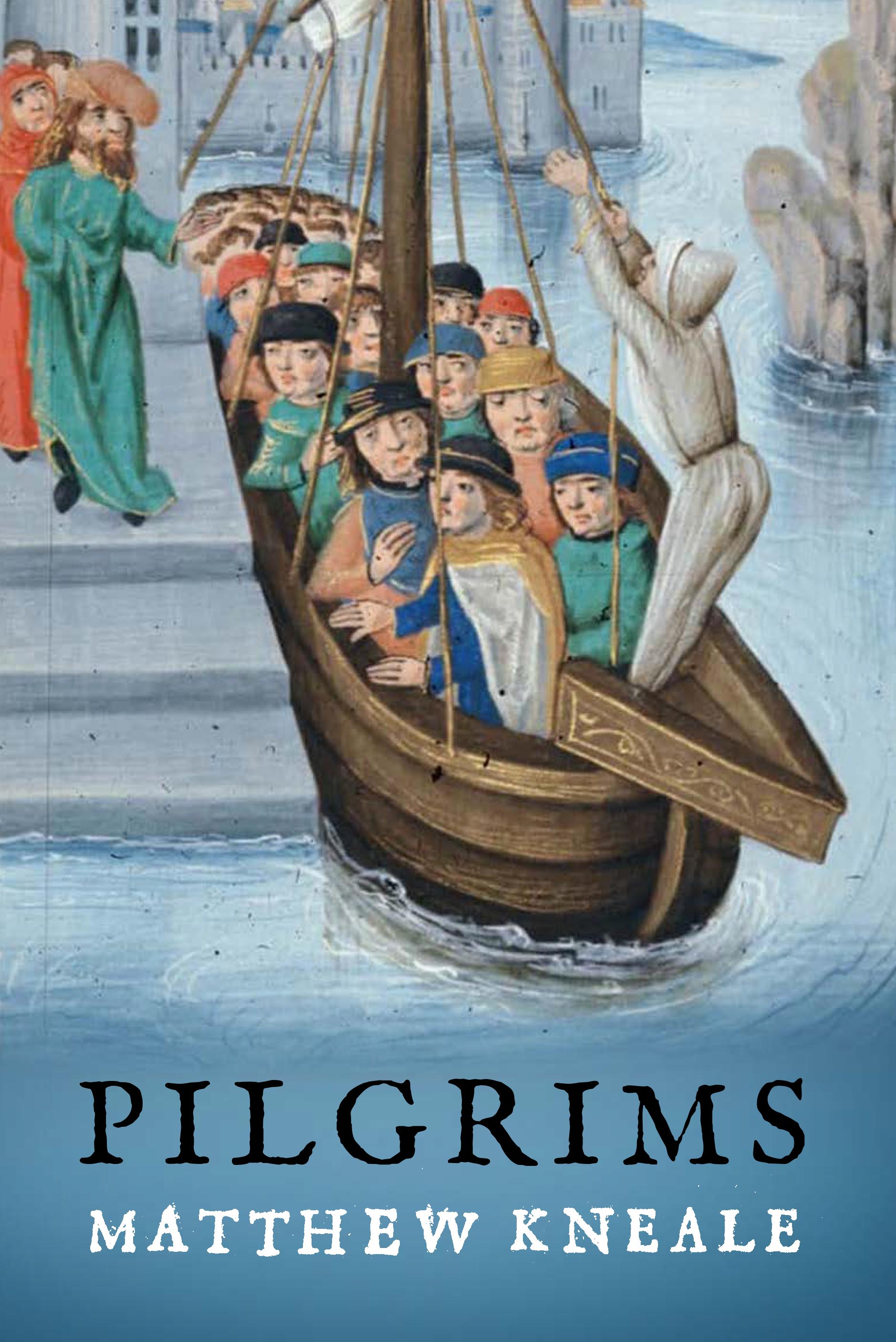 |
.... |
Pilgrims |
It is the year 1289. A rich farmer fears he'll go to hell for cheating his neighbours. His wife wants pilgrim badges to sew into her hat and show off at church. A poor, ragged villager thinks his beloved cat needs to be rescued from the fires of purgatory. A mother is sure her son's illness is punishment for her own adultery and she desperate to be forgiven so he may be cured. A landlord is in trouble with the church after he punched an abbot on the nose. A sexually driven noblewoman wants to divorce her venal husband so she can marry her new young beau. A radical tailor wants to win of win the ear of the pope so he can overturn what he sees as a corrupt, unjust world that favours the rich.
All of these characters join a group of pilgrims that sets off on the tough and dangerous journey from England to Rome, where they hope all their troubles will be answered. Some in the party have their own, secret reasons for going.
Matthew Kneale's new novel, 'Pilgrims' is a riveting, sweeping narrative that shows medieval society in a new light, as a highly rule-bound, legalistic world. Though religious fervour and the threat of violence are never far below the surface. Told by multiple narrators, 'Pilgrims' has much to say about Englishness, then and now.
Reviews of the book include, from the Sunday Times, 'Matthew Kneale's new novel could hardly be a more welcome getaway from our present world of lockdown and social distancing... a novel that brims with comedy... Humane outrage pulses through this novel along with comic ebullience.' '... a warm-hearted tale, full of intriguing historical detail, plot twists and comedic light touches.' (The Times). 'For all of the hilarity of the pilgrims' capers, Kneale does a good job of showing us the darker side of British history - and reminding us that in silence lies complicity.' (Financial Times). '... a sly, humane comedy' (Guardian). 'A source of constant delight... a wonderful novel.' (Front Row, BBC Radio 4).
_______________________________________________________________________________________
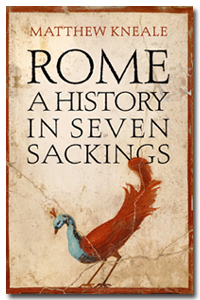 |
.... |
Rome - A History in Seven sackings |
A
fascinating history of the city of Rome, seen through
the eyes of its most significant sackings, from the
Gauls to the Nazis and everything in between.
No
city on earth has preserved its past as has Rome.
Visitors stand on bridges that were crossed by Julius
Caesar and Cicero, walk around temples visited by
Roman emperors, and step into churches that have hardly
changed since popes celebrated mass in them sixteen
centuries ago. These architectural survivals are all
the more remarkable considering the violent disasters
that have struck the city. Afflicted by earthquakes,
floods, fires and plagues, it has most of all been
repeatedly ravaged by roving armies. Rome: A History
in Seven Sackings examines the most important of these
attacks and reveals, with fascinating insight, how
they transformed the city - and not always for the
worse.
From
the Gauls to the Nazis, Kneale vividly recounts those
threatening the city, while drawing an intense and
vibrant portrait of the city and its inhabitants,
both before and after being attacked. In these troubled
times when our cities can seem fragile, Rome's history
offers a picture that is both shocking and also reassuring.
Like the Neapolitans from Norman Lewis's Naples 44,
Romans have repeatedly shrugged off catastrophes and
made their city anew.
A
meticulously researched, magical and novel blend of
travelogue, social and cultural history, Rome: A History
in Seven Sackings is part celebration of the fierce
courage, panache and vitality of the Roman people,
and part passionate love letter to Rome. This is a
popular history of the famous, incomparable city like
no other.
_______________________________________________________________________________________
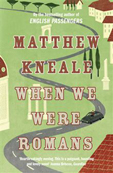 |
.... |
When
We Were Romans |
Nine-year-old Lawrence
is the man of his family. He watches protectively
over his mother and his willful little sister Jemima.
He is the one who keeps things order, especially when,
quite suddenly, his mother decides the three of them
must leave their live in England behind.
Their destination is Rome, where she
lived when she was young, and as they drive through
the night in a car filled to bursting, the excitement
takes them back to those happier days. For Lawrence,
fascinated by stories of popes and emperors, Rome
is an adventure. Though short of money, and passed
from one to another of his mother’s old friends,
it seems that little by little their new life is beginning
to shape. But the mystery that brought them to Italy
will not quite leave them in peace.
When
We Were Romans is a haunting psychological novel.
Powerfully evoking the feelings of childhood –
the triumphs, the jealousies, the fears the possessions,
the love – it is most of all the story of Lawrence:
of how, with a wisdom well in advance of his years,
he strives to keep his family together, as everything
he understands is turned upside down.
_______________________________________________________________________________________
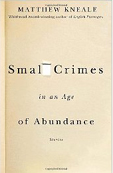 |
.... |
Small
Crimes in an Age of Abundance |
In his volume of gripping short
stories, Matthew Kneale takes us on a journey around
today’s uncertain world. From England to South
America, China to the Middle East, the united States
to Africa, Kneale applies his gifts as a master storyteller,
vividly capturing the lives of ordinary people as
they struggle to live and to do the right thing, often
managing neither.
We follow a smugly well-intentioned
English family, who leave their tour group in China
to travel alone and collide with the ruthless side
of the country, slowly becoming complicit with its
violence; a charmless oil worker in a dusty Central
Asian village who realizes he can possess the local
beauty; a ploddingly respectable London lawyer who
chances upon a stash of cocaine and discovers it offers
the wealth and status he hungers for; a devoted housewife
in the American Midwest who finds herself compelled
to betray her husband and family; a self-doubting
suicide bomber.
Matthew
Kneale transports readers across frontiers in an instant,
setting the foreign and the familiar side by side,
and challenging our understanding of both. By turns
painful an, moving and wickedly funny, the book gains
momentum until the world seems to be revealed to us
in a new way. Small Crimes in an Age of Abundance
si a ground-breaking work by a master of the uncertainties
of our time.
_______________________________________________________________________________________
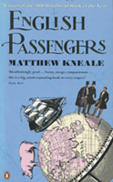 |
.... |
English
Passengers |
Determined to prove
the literal truth of the Bible against atheist geologists,
the Reverend Geoffrey Wilson sets out from England,
in the summer of 1857, with an expedition of to find
the Garden of Eden, which he is convinced lies on
the island of Tasmania. Unknown to him, others in
the party have very different agendas, notably the
surgeon, Dr Potter, who is developing a revolutionary
and sinister thesis of his own on the races of man.
To complicate matters further, the ship Wilson has
hurriedly chartered, crewed by Captain Kewley and
his secretive Manxmen, is in fact an ill-starred smuggling
vessel, its hidden compartments filled with contraband,
brandy and tobacco.
As the vessel journeys haplessly southwards,
in Tasmania itself an Aboriginal names Peevay recounts
his people’s struggle against the invading British,
who prove as lethal in their good intentions as in
their cruelty. This is no Eden but a world of hunting
parties and colonial ethnic cleansing. As the English
Passengers near Peevay’s land, their bizarre
notions ever more painfully at odds with reality,
it grows clear that a mighty collision is approaching.
English
Passengers is narrated by over twenty characters,
each so distinct that the effect is of a story not
so much told as peopled. In a storm of hugely entertaining
voices it brings a past age to vivid and memorable
life.
______________________________________________________________________________________
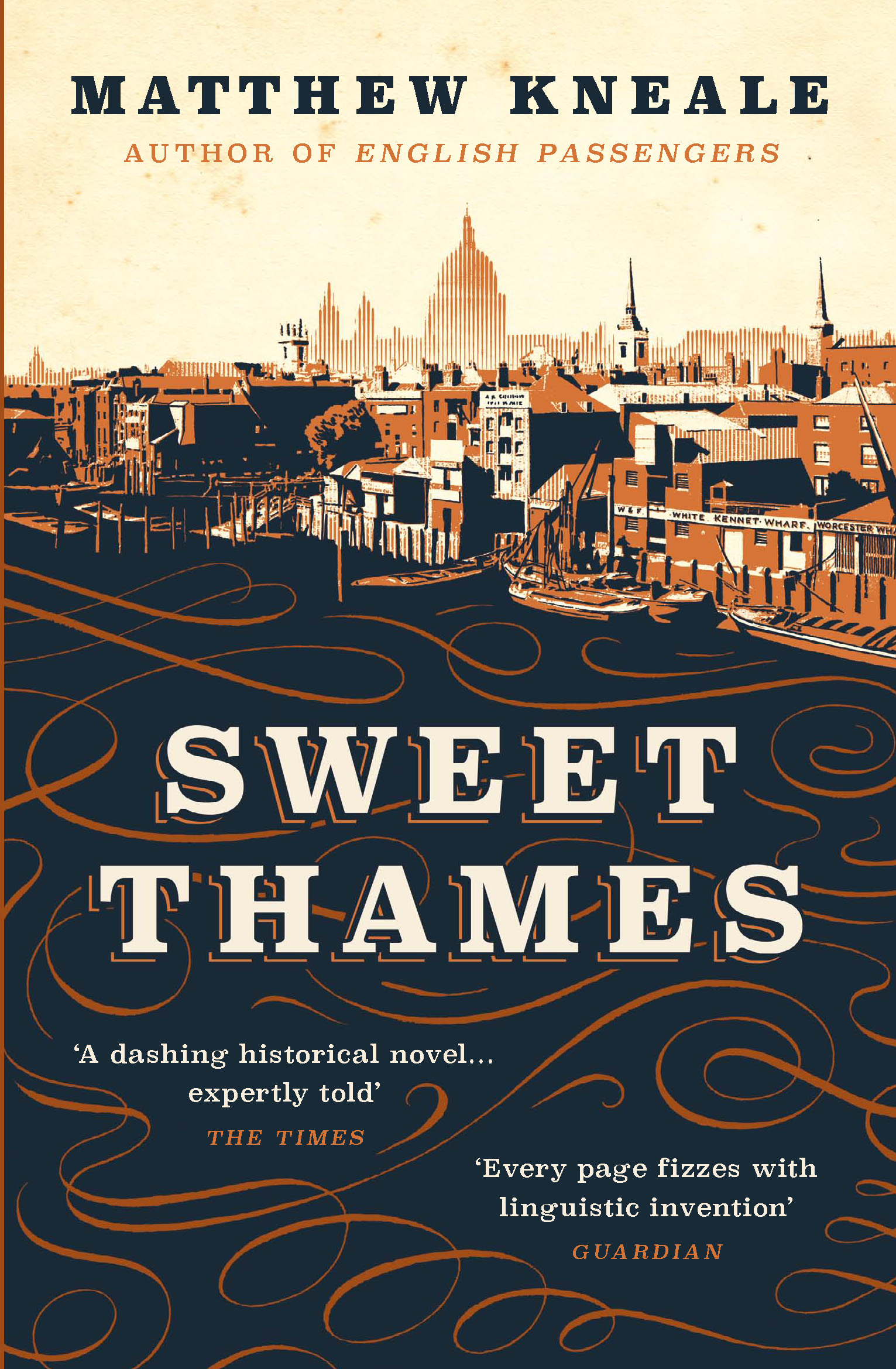 |
.... |
Sweet
Thames |
London
in the summer of 1849. With a deadly cholera epidemic
threatening, young engineer Joshua Jeavons is convinced
it is his mission to save the capital and reform its
festering sewers. Meanwhile in his dometsic life he
is troubled by the baffling coldness shown towards
him by his beautiful bride, Isobella. As he struggles
to win her round, he works feverishly on a revolutionary
drainage plan. This is his dream, his dazzling vision
of the future: a London free of effluent. Then a sudden
and mystifying disappearance throws his whole life
upside-down. He is forced to embark on a harrowing
search, which plucks him from his respectable life
and throws him into a London previously unknown to
him. A netherworld of slum-dwellers, pickpockets and
scavengers of the sewers. He will find it is this
very world that holds unexpected answers to the mysteries
that surround him.
______________________________________________________________________________________
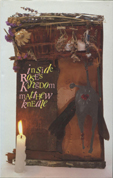 |
.... |
Inside
Rose's Kingdom |
“They’re just not
my sort of people.” William Cade sometimes feels
he should like Rose and the other members of the shared
house. They are so kind. Far more so than the family
he has so recently broken away from, to escape the
tedium of farm life. But he finds Rose Rose’s
concern disquieting. And there is a strange intensity
to the household, with its trust games and therapy
sessions they urge him to join, for his own good.
Slowly he begins to control of his new urban life,
and finds himself sure of very little, least of all
his own judgement.
Matthew
Kneale’s blackly humourous second novel, Inside
Rose’s Kingdom, seeks out the strangeness of
today’s niches and corners: a London Squat,
Mr Skate’s bucket shop travel agency, a frenzied
hall in the DHSS and, of course, Rose’s household
itself.
_______________________________________________________________________________________
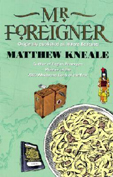 |
.... |
Whore
Banquets / Mr Foreigner |